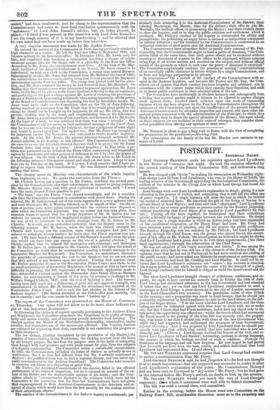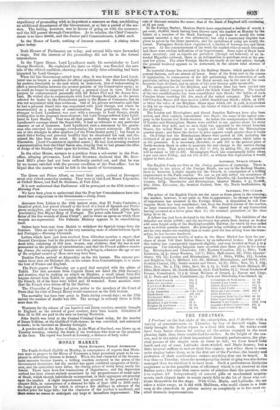POSTSCRIPT.
SATURDAY NIGHT._ Lord GEORGE BENTINCIC made his rejoinder against Lord Lyndhurst in the House of Commons last night. He took the occasion afforded by the second reading of the Patent Commission Bill, and delivered a long speech. He was charged with "levity" in making his retractation on Wednesday night: that charge came ill from Lord Lyndhurst,. who was, in the House of Lords, the leading member of the Government appointing the Ecclesiastical Commission, the authors of the mistake in the Clergy List on which Lord George had based his retractatiou.
Lord George went over Lord Lyndhurst's explanation in detail; giving it a new colouring in the process of recital, and contending that it still left the affair one of grave suspicion. [A single instance will show the 'way in which he twisted the recital of admitted facts. He described the gift of the living of Nocton private friend of Lord Ripon's; and then said that "afterwards' Lord Lyndhurst sent a list of six or seven gentlemen as persons suited for the Bombay judgeship, without mentioning that Lord Ripon first applied to Lord Lyndhurst for that list.] Putting all the facts together, he maintained that their coincidence proved a friendly exchange of patronage between the two Ministers. He denied that there was a single instance in which an Indian judge had been superseded on his conditional resignation, as Sir Henry Roper had been. Mr. Perri had been nineteen years out of practice, and did not possess the public confidence. The Bombay Judgeship was not solicited by Mr. Pollock; but Lord Lyndhurst himself, through the Chief Baron, was the person who almost forced the accept- ance of this office on Mr. Pollock. On investigation he believed it might be shown that Lord Lyndhurst had a great deal to do with these appointments, [the three legal appointments,] through the intervention of the Chief Baron.
He was not ashamed of his "early associates and habits." It was among the objects of his pride that he was still one of the stewards of the Jockey Club. For eighteen years that he had sat in Parliament he had never received one shilling of the public money; had never asked any Minister for employment or patronage; and his early associates had been Mr. Canning and Lord Stanley. It could not be re- torted that Lord Lyndhurst's calumnies are " coarse": his sarcasm is classical, his weapon polished ; and while he uses the rapier with the strength of a giant, Lord George confessed that he himself is obliged to wield the broad-sword and the bayonet.
But when Lord Lyndhurst brought charges of selfishness, sordidness, and ra- pacity, he ought to have carried his memory back to Friday the 10th of July. Lord George had disclaimed adherence to the late Government and had attacked it before that day; yet on that day Lord Lyndhurst condescended to send "S, messenger to Lord George, a great merchant in the city of London, accompanied by the Lord Chancellor's own secretary. The gentleman called at nine o'clock in the morning; and a proposition was made to Lord George, that he should join a minority, represented by lord Lyndhurst to exist in the late Cabinet, on the sub- ject of the Sugar-duties. " I do not know whether Lord Lyndhurst and the three colleagues who he intimated agreed with him were to serve with me or under me; but this I know, that had 1 been ambitions, had it been my object only to ob- tain_power, the opportunity was offered me; whilst the breath which had announced the Royal assent to the passing of the Corn Bill was scarcely cold, the proposi- tion was made to me that I should join with those of the late Government who, while they had supported, had condemned the measures of that Government. (Great cheering.) And it was proposed by Lord Lyndhurst that he should per- sonally wait upon that selfish, that sordid, that base individual who is now ad- dressing you." (Cheers.) Lord George declined the -honour of the visit, and re- ferrcd Lord Lyndhurst to Lord Stanley; intimating, perhaps in strong language, the manner in which his feelings revolted at such a coalition. Perhaps the frankness of his language had not been forgiven. He now hoped he had proved that he could not have been the base, sordid, and selfish individual that Lord Lyndhurst had represented him. (Loud cheers.) Mr. STUART WORTLEY expressed surprise that Lord George had omitted to notice a communication from Mr. Perry. Lord GEORGE BENTINCIL said, he had forgotten id—he had not thought it of so much importance—had not supposed any necessity to notice it after Lord Lyndhurst's explanation of the point. Mr. Commissioner Holroyd had not been sent to Liverpool to " dry-nurse " Mr. Perry; but he had gone in the interval before Mr. Perry's arrival, no doubt to look up the arrears. Mr. STUART WORTLEY would not touch the rest of Lord George's statement: those whom it concerned were well able to defend themselves.
The bill was read a second time, and committed.
Earlier in the evening, before the House went into Committee on the Railway Board Bill, considerable dismission arose as to the propriety and
expediency of proceeding with so important a measure as that, establishing an additional' department of the Government, at so late a period of the ses- sion. The feeling, however, was in favour of going on with the measure; and the bill passed through Gommittee. As to salaries, the Chief Commis- sioner is to have 2000/, and the Junior paid Commissioners, 1,500/ each.
In the House of' Lords, nothing of interest occurred. A sitting takes place today.



























 Previous page
Previous page